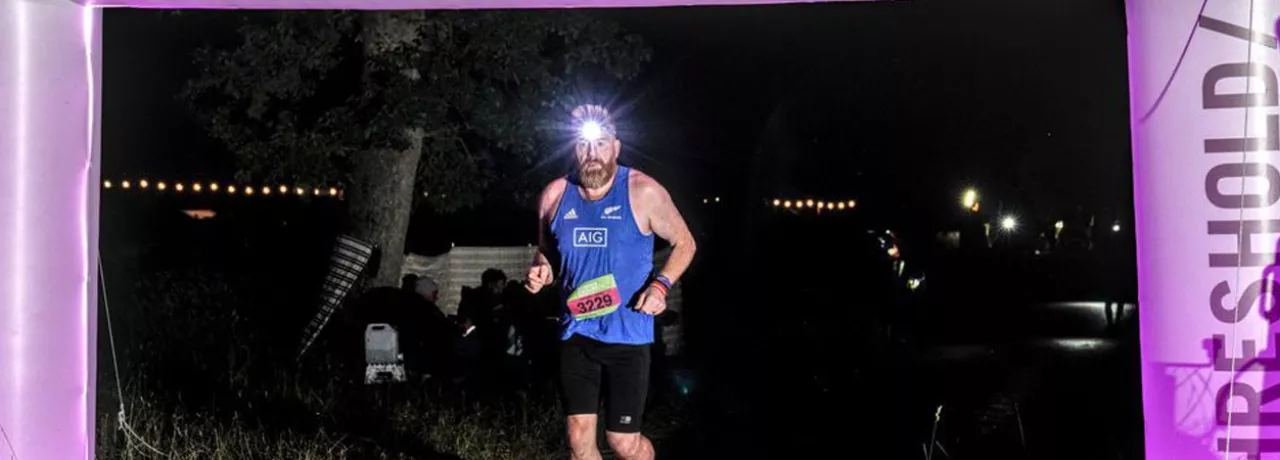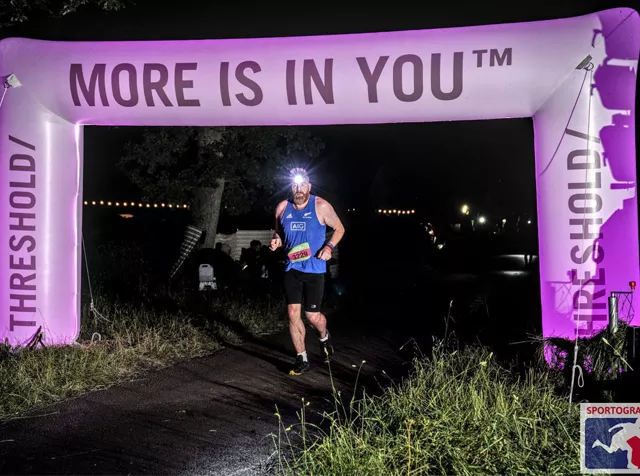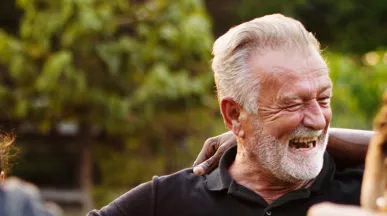Men’s Health: Resilience & Mindset. A Guest Blog by Rob Murray

“Undertaking endurance challenges has forced me to completely reframe my attitude to success, resilience and my own view of my self-worth. Now, I define resilience very simply – the ability to negotiate obstacles in a sustainable way.” During this guest blog, exclusively for Pluxee UK, New Pangea Founder, Rob Murray, paints a picture of resilience and the power of shifting your mindset by sharing a recent experience of physical and mental endurance, reflecting on the importance of camaraderie – men supporting men – during Men’s Health Month and beyond.
Why Men’s Health is Important to Discuss
June is Men’s Health Month, and the theme for 2025 is ‘Closing the Empathy Gap’, encouraging us to reframe how we discuss men’s health. The campaign dedicates its efforts to breaking the taboo around men discussing health matters.
Our guest blogger, Rob Murray, recently joined us on a podcast alongside his New Pangea partner, Jack Biss, where both men openly discussed their experiences and journey to resilience. Having reached burnout in his previous profession within the Police, Rob is all too familiar with the importance of reframing the conversation.
Read on to gain Rob's perspective.
Physical Challenge. Emotional Strength
I recently completed a 24-hour endurance race with four friends, along with 2000 other equally “odd” individuals. The objective was simple: complete as many laps of the same 5-mile course as you are able within that 24-hour window. The race started at midday on the Saturday and concluded 24 hours later on the Sunday. Some people run it alone or in pairs, with some breaking the 100-mile mark individually. Then, there are relay teams of up to 12 people, where each competitor may complete the woodland trail once or twice. It does not matter if you run, walk or, in many cases, hobble the route. They all count the same.
As a team of five, we took turns running a single lap before handing over to the next person. At our pace, we generally had about three hours of rest between each lap. We would grab suitably carb-heavy food and hydration and a nap here and there. The weather was not in our favour, and the first 12 hours saw pretty heavy showers. The course quickly turned from slippery to very muddy in no time, but there was something quite liberating about running in the rain.
To many people, this is their idea of purgatory, having to negotiate the same hilly route repeatedly with little or no sleep through what was, at times, biblical weather conditions. You might expect a cohort of competitors with six packs and a significant social media following to make up the bulk of entrants, but that could not have been further from the truth. The diversity in age and body shape was immediately visible, but less obvious was that we all arrived at the start line with different reasons driving us to enter, variable levels of sporting experience or training --some were carrying injuries, and others even tried to make the task even harder -- one solo runner completed the 24 hours carrying a fridge on his back the whole way!
The Power of Community
Our collective endeavour created a connection and camaraderie that removed all barriers of social anxiety, allowing conversations to flow while waiting at the relay changeover point or in the queues for the loo. Hearing the stories that had brought people to this muddy field in Berkshire was inspiring, humbling and compelling. Some were there to honour the memory of loved ones lost to suicide or cancer, some to raise money for good causes, some to test themselves physically, or just to spend a weekend away with friends in the open air. The different journeys that brought us to the start line made this event far more interesting than if we had all been professional athletes.
Whilst slipping my way up a very muddy hill (referred to by competitors as Heartbreak Hill with good reason), perhaps slightly delirious from lack of sleep and overconsumption of sugary sports drinks and jelly sweets, I was struck that this bizarre event was a perfect metaphor for how we each navigate the modern world and how society frames resilience and success.
There were, of course, people who seemed to glide effortlessly past me and who were able to have no discernible drop in speed as they negotiated the hills and didn’t even seem to get muddy while the rest of us ploughed through mud that often went over my ankle. Others walked, some with poles, the entire route, keeping an even pace and falling into a rhythm with other competitors as they chatted all the way around. One lady had a small speaker strapped to her back, and she sang along to show tunes as she made her way around. The beauty of this event was that the speedsters and walkers congratulated each other equally as one passed the other.
It was clear that in this setting, each saw the merit and value in what the other was doing.
The Role of Mindset
I chatted with one chap who was camping near us in the latter part of the event as we both gingerly walked back towards our respective tents. He worked in a local school's kitchens and had been a last-minute addition to the team, which appeared to be predominantly made up of PE teachers. He told me that a team member had dropped out due to injury, and he had reluctantly agreed to take their place on the proviso that he would only complete two laps. At the time we were chatting, he had just finished his third and was hoping to fit another one in before the end.
He started by talking down his achievement: “I know everyone else has done more, and I know that I am really slow…” I interrupted him and challenged the narrative that his contribution or achievement was any less than anyone else’s. It was clear that his teammates shared my view, as I heard the cheers as he arrived back at their camp, where they, too, celebrated his success.
As the event progressed into the final few hours, the initial pace of runners started to drop a little. Some people were nursing blisters, and the running gaits got shorter and, in some cases, became a limp; despite this, the mood remained high. The end was in sight. We all knew that at midday, we could prioritise recovery and rest, which allowed most people to dig a bit deeper and find that motivation that brought them to the start line and get the job done.
Imagine if we allowed ourselves the permission to apply the same mindset in other parts of our lives. If we acknowledged our achievements and those of others on the basis of our individual journey, and not on a single measure of success applied equally to everyone. If we included recovery and rest as a critical part of delivering challenging tasks, it could allow people to go further and make high performance more sustainable.
Reframing Resilience
In previous careers, I framed resilience as stoicism, the ability to keep going and push through no matter the cost. If I acknowledged that something was hard or challenging, it was a sign of weakness or failure. I believed that my ability to perform was linear and that if I fell short of previous achievements, that could only be considered a failure. I judged my successes or failures by comparing myself to others, knowing nothing of the journey that they had taken to get there, or even acknowledging my own. I am certain that this approach led to me burning out and leaving a career that I loved.
Undertaking endurance challenges has forced me to completely reframe my attitude to success, resilience, and my own view of self-worth. Now, I define resilience very simply -- the ability to negotiate obstacles in a sustainable way. This does not mean that I don’t challenge myself or others around me. I am probably more ambitious now because I know that we are all capable of achieving extraordinary things, and I was often limited by my own inner voice. To be able to push harder when it matters, recover, and then push again means I am capable of more than I ever thought possible. But equally, some days, just not giving up is an achievement to be celebrated.
So, as I stretch these sporting metaphors as far as they can go, life is an endurance event, not a sprint. You arrive with a completely different journey from everyone else, and your measures of success are your own. If possible, prepare for when you need to dig deep. The only way to sustain your high performance is to deliberately build in things that help you recover.
Meet Our Guest Blogger
Rob joined the police force in 2003. It was a career that provided variety and challenge, and he took to the role immediately, relishing in the team spirit needed to overcome what, in the face of it, were insurmountable challenges. As the years passed by, the shift patterns, poor diet, lack of sleep and excessive alcohol consumption began to take their toll. Rob was more irritable; he was procrastinating, but he finally acknowledged something was wrong when he started forgetting the names of his colleagues in meetings.
For the sake of his health, Rob eventually left the police force, but in doing so, he lost his sense of identity.
Searching for something new, for validation and purpose, Rob responded to an advertisement he spotted on the front of a national newspaper -- an amateur four-person crew had just broken two world records for rowing unsupported across the Atlantic. He'd never rowed before, but he knew it was the change and challenge he needed. The experience broke his perception of resilience, making him stronger in the process. Jack joined the crew, undergoing a similar shift in perception, and this epic tale is how New Pangea began.
Discover more about New Pangea here.








